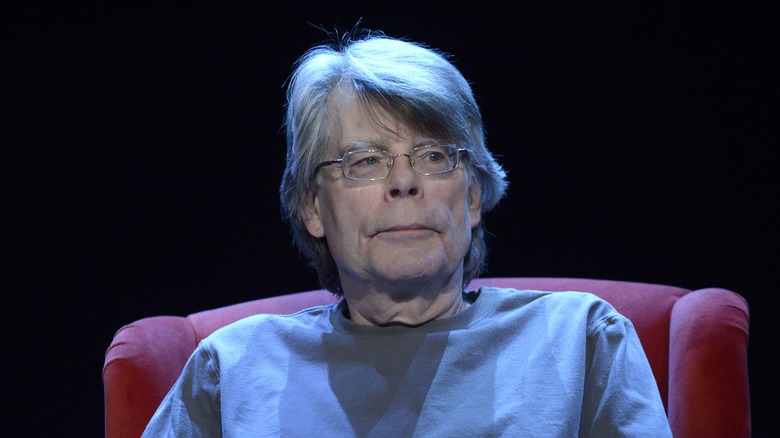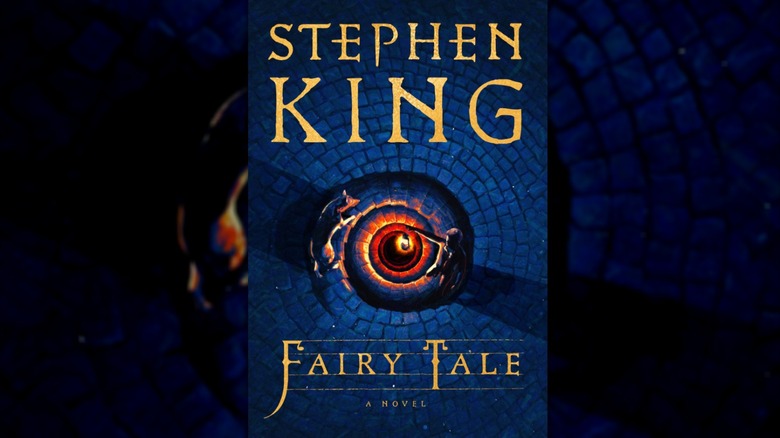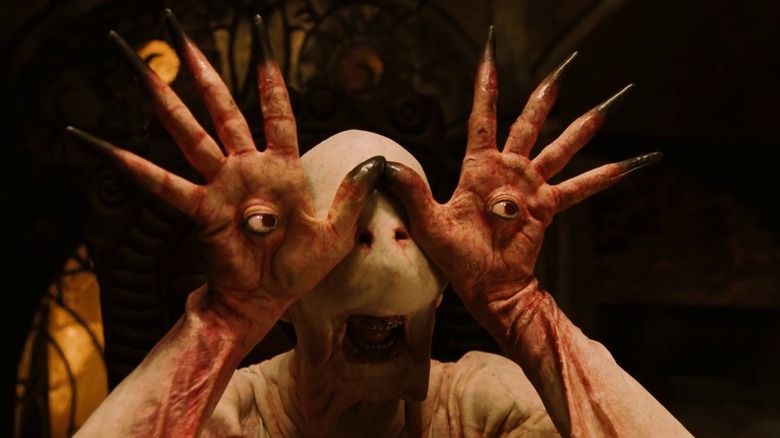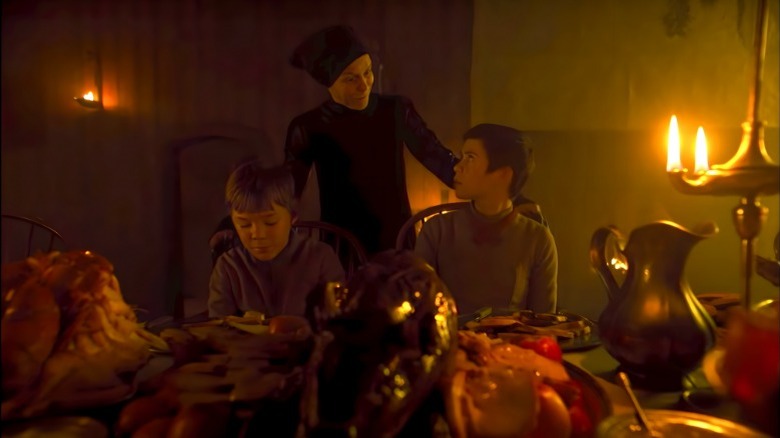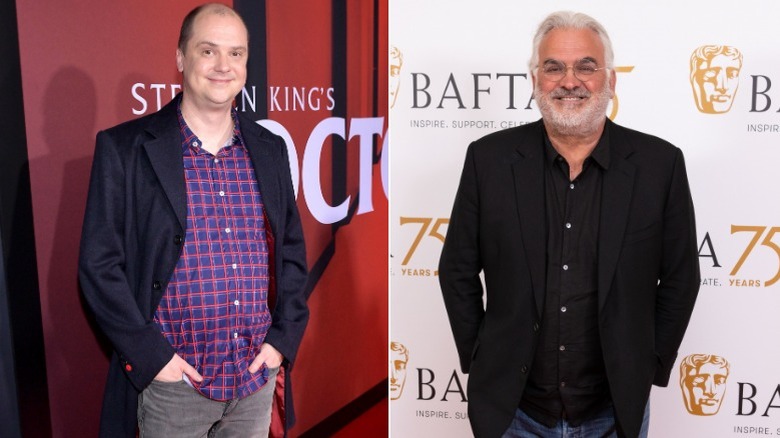Stephen King's Fairy Tale Movie Adaption Will Only Work If It Embraces Its Horror Elements
Stephen King is known predominantly for his spine-tingling scares, but there is something special about his fantasy books.
For many, "The Dark Tower" series is considered his magnum opus, and for good reason. Merging classic Western tropes with a fantasy scope, crafting a world of both dark wizards and noble cowboys, the "Dark Tower" is a truly unique narrative that, unfortunately, hit some snags on its way to the big screen. We all remember the tragically mishandled 2017 film that squandered the potential of Idris Elba as gunslinging Roland, and while there's hope that "Midnight Mass" maestro Mike Flanagan will strike gold with his own "Dark Tower" adaptation, King has other fantasy novels primed for film — because, as any King lover knows, "There are other worlds than these."
Paul Greengrass knows what sort of other worlds people need, thankfully, and just a month after King's novel "Fairy Tale" was published in 2022, he snapped up the rights. That's a quick turnaround for a King novel-to-film, but really, it's a classic King setup that the author's obsessives will recognize right away: "Fairy Tale" tells the story of 17-year-old Charlie Reade is coming to terms with his mother's premature death and his father's alcoholism, when he forms a deep connection with an elderly dog, which accidentally leads him to a portal to another world. Instead of the straight horror fare you may expect, though, this portal leads to Empis — the place where our world's fairy tales come from.
When it comes to adapting "Fairy Tale" successfully, this is still King we're talking about, and he puts the fantasy genre through the wringer. With that in mind, "Fairy Tale" features some pretty horrific imagery, and a film adaptation simply will not work without being true to that.
In King's Fairy Tale, classic fantasy myths get a dark twist
When Stephen King sat down to write a new book in the full thrust of the lockdown, he wrote a novel that everyone needed. "Fairy Tale" was written to take his mind off the world at large.
"What could you write that would make you happy?" King asked rhetorically, in an Entertainment Weekly statement. But don't let that lull you into a false sense of security. What counts as "happy" for King still isn't that comforting to most of us. In the book, the author takes classic fairy tale characters and tropes, and he then crafts gruesome versions of them that could only exist in his horror universe. Charlie himself is a stand-in for the boyish fairy tale protagonists we all recognize, but as much of a good guy as he seems, there's a dark side to him. Like Jack in "Jack and the Beanstalk," he journeys to another world, but unlike Jack living in poverty with his widowed mother, Charlie has a recovering alcoholic father, trauma from his mother's death, and past misdeeds to atone for. Classic King.
In many ways, "Fairy Tale" is a grown-up "Jack and the Beanstalk," complete with giants. However, even some lesser-known fables have their fair shake. Here, the mythological Gogmagog (from English and Welsh legends) is not just a beast with a fantastic name — he's a beast straight out of an H.P. Lovecraft novel, too fearsome to even comprehend. Bringing these elements together results in a book like no other in King's career — which means translating to film will require a very careful and pragmatic approach that balances the fantasy, the reality, and the creepiness.
The Fairy Tale movie needs to subvert tropes, not follow them
Once again, we must harken back to one of Stephen King's greats, "The Dark Tower." Scenic saloons, gunslingers wielding pistols, facing off against a villain literally named the Man in Black. These are hallmarks of Westerns. And though that would be a pretty good story, think again about horrific moments like Roland performing an abortion with his mystical gun. What makes King's work feel so real is the combination of heart and horror. Taking away either side of the equation would be detrimental, and the same goes for adapting "Fairy Tale."
These genre mashups only work when you subvert the narrative (and maybe if "The Dark Tower" film kept that in mind, we would have been better off). "Fairy Tale" needs that horror to get its point across. It can't be just about young Charlie going into a fantasy world and saving the princess, as some filmmakers might be inclined to approach it. In fact, the novel intentionally goes against fairy tale tropes by showing Princess Leah as a cursed figure, left with no mouth on her face, who arguably becomes the book's real hero in a bloody scene straight of any horror flick. And unlike so many other modern takes on empowered princesses, Leah's depiction in "Fairy Tale" isn't pandering: she's strong but also deeply flawed. Her big moment is one of pain and sacrifice, and — without spoiling too much — it's also downright metal.
Horror and fantasy just works. After all, Guillermo del Toro has practically made a career out of it. If there's a right tone to strike with "Fairy Tale," in that regard, "Pan's Labyrinth" is a great model.
Fairy tales are, at their core, horror fables (& King knows that)
Disney has demonstrated an aptitude for spinning folklore into gold. But the fairytales of yesteryear come from oral traditions and explanations for how the world works. You think Hans Christian Andersen's tale of "The Little Mermaid" is so quaint? Let's all remember that in the original tale, when she gets her human legs, she feels like she's stepping on knives.
The Brothers Grimm had a particular affinity for the macabre, telling stories of cannibalism as a reminder to keep your eyes on your kids. Oz Perkins had a decent grasp on this when he directed his version of the story in the darkly lit but somewhat faithful "Gretel & Hansel." Full of satanic imagery, the 2020 film weaves a folk horror story that is on par with "The Witch."
These are all precursors for the world that Stephen King has written. One can argue that he is an author who has been preparing for a take on fairy tales all his career. Like his predecessors, he uses terror to teach a lesson. Only through pain and sacrifice do people develop real character change. Without paying homage to the horror of folklore, "Fairy Tale" would be just another Disney film, and that would go against the spirit of the novel.
Stephen King adaptations depend on the director - but Greengrass will take it seriously
In the wrong hands, any adaptation can fail, and Stephen King has had some unfortunate luck in the past. But when directors take his books seriously, they have become some of the best horror movies out there. Frank Darabont's handling of "The Mist" was celebrated by the author, who famously complimented the changed ending of the 2007 film. Mike Flanagan, meanwhile, is probably the most successful adapter of King's work in recent years. "Gerald's Game" was considered unadaptable before the "Midnight Mass" director got his hands on it, and his version of "Doctor Sleep" combines both King and Stanley Kubrick's canon of "The Shining" into one perfect omelette that King himself praised.
Now that "Bourne" franchise director Paul Greengrass will be helming the newest King project, the stakes are high. But if nothing else, Greengrass does take his projects very seriously — and most importantly, he has the confidence of the author: "Needless to say, I'm a Paul Greengrass fan and think he's a wonderful choice for this film," King reported to Deadline.
If this adaptation is going to work, respecting the source material is paramount. Greengrass doesn't appear to have a problem with that, stating that the book is, in his words, "A work of genius — a classic adventure story and also a disturbing contemporary allegory." As much as we can gauge from a short statement, Greengrass appears to at least have an understanding of the material's depth. And if he can delve into the horror elements of "Fairy Tale," this movie can succeed where "The Dark Tower" failed.
